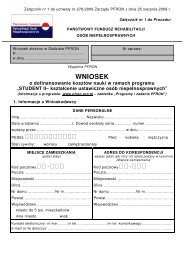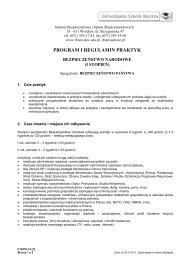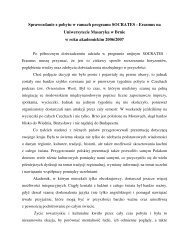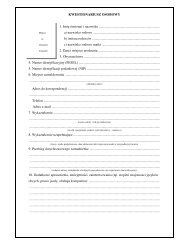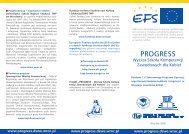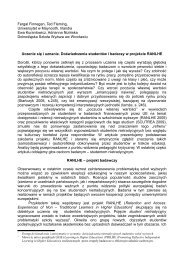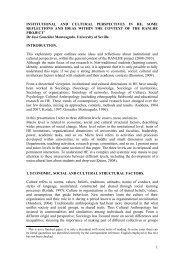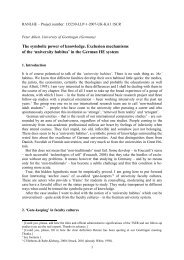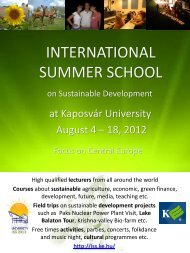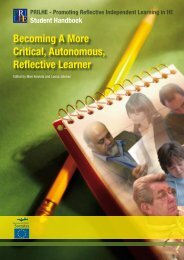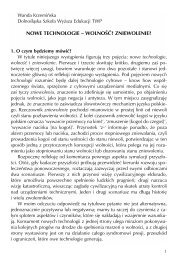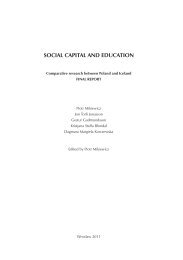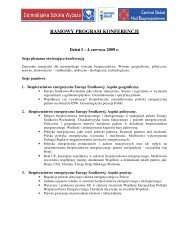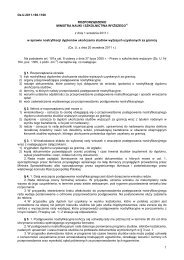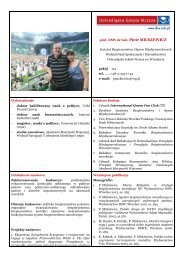Becoming A More Critical, Autonomous, Reflective Learner
Becoming A More Critical, Autonomous, Reflective Learner
Becoming A More Critical, Autonomous, Reflective Learner
You also want an ePaper? Increase the reach of your titles
YUMPU automatically turns print PDFs into web optimized ePapers that Google loves.
PRILHE Project - Lecturer’s Toolkit<br />
Being an independent learner might mean being isolated from the community of other learners which is never the case while<br />
learning. In reality we are dependent on colleagues, friends, families, teachers, society, culture and time etc. and at the same time<br />
we are autonomous through seeking uniqueness, self-independence and integrity. We can never be free from this tension. We are<br />
both autonomous and dependent at the same time and we strive all the time to be the both. There might be, for example, ethical<br />
dilemmas regarding humankind or loyalty dilemmas regarding family or friends. Students can experience, for example, a dilemma<br />
when teachers expect them to become independent learners and yet demand that they reproduce knowledge on teachers’ own<br />
terms.<br />
Individual – social<br />
Individualism is a typical characteristic of the Western thinking which is prevalent today. Yet the notion of individualism is<br />
paradoxical. At the same time as being situated in a world filled with stimuli and new opportunities, we may often feel isolated and<br />
lonely. Although our lives are constructed around individuality and uniqueness, we also like to be like others. In addition, the world<br />
becomes smaller because of globalisation processes and all the advancements of new technology. Individualism itself is not only a<br />
historical idea well rooted in liberalism and modernity, but also a contemporary one, emerging from post-modern thinking where an<br />
individual is put on a pedestal and looked upon as having full potential.<br />
Here we challenge the prevailing view in the contemporary higher education ideology that each learner, because of their<br />
uniqueness and individuality, learns differently, i.e. in a specific and unique way without being affected by others. We will, however<br />
go beyond a dichotomous approach to collective versus individual learning and discuss the idea that learning, even from the very<br />
beginning, is characteristically a social process, neither essentially individualistic nor collective.<br />
In education, whether at a lower or higher level, individualism is stressed and demanded more than ever. This has to do with two<br />
factors: first, with the ideology of post-modernity or late modernity, and second, with the concept of learning taking precedence<br />
over the notion of education (Biesta, 2005). Even research is constructed in this way. Some educationists, who proceed from<br />
Piaget’s cognitive psychology, also follow the line of individualism. At the same time there is a debate among social scientists<br />
which suggests going beyond the Cartesian split of mind and body, structure and subjectivity, individuality and society, and instead<br />
taking an inter-subjective approach.<br />
Inter-subjectivity and the self are important concepts to point out, because sociality or intersubjectivity is not just an opposition to<br />
individuality. Unlike some educationists who use the pair of concepts individual versus collective, there is rather a combination or a<br />
close relationship between both, where inter-subjectivity is a condition and a framework for an individual to develop and change.<br />
Sociality does not lie beyond individuals or is made by particular individuals or even placed over an individual, but can be<br />
understood as conduct or action which is commonly coordinated. We can get support from Dewey (1938) for whom all human<br />
experience is ultimately social. What he means literally is that it involves contact and communication.<br />
Instrumental – discursive<br />
In some theories learning can be of two different kinds. They differentiate between learning to perform and learning to understand<br />
what adults communicate to each other. Following this logic, and based on thorough research, Mezirow distinguishes two types of<br />
learning: instrumental and communicative. Habermas in his work includes, among others, instrumental and discursive conduct<br />
which can of course be related to learning, if we see learning as a process of action.<br />
Instrumental learning relates to know-how about the world around us. We learn to manipulate and control reality, e.g. we learn to<br />
swim or/and to build complex instruments. This kind of learning is characteristic of both everyday life practices as well as formal<br />
learning: it helps us to solve practical problems as well as scientific, technological problems. In instrumental learning we employ<br />
the hypothetic-deductive approach while solving the problems, i.e. from a logical and rational presumption, we attempt to collect<br />
facts (also by experimenting) to be able to test our own hypotheses. The purpose of this learning is to be able to explain nature and<br />
to deal with it by adopting it to human conditions.<br />
<br />
<strong>Becoming</strong> A <strong>More</strong> <strong>Critical</strong>, <strong>Autonomous</strong>, <strong>Reflective</strong> <strong>Learner</strong>



